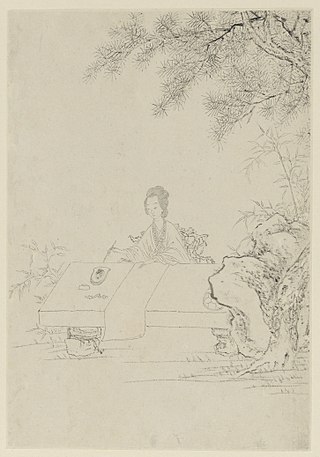Top Qs
Timeline
Chat
Perspective
Wei Shuo
Chinese calligrapher (272–349) From Wikipedia, the free encyclopedia
Remove ads
Wei Shuo (simplified Chinese: 卫铄; traditional Chinese: 衛鑠; pinyin: Wèi Shuò, 272–349 CE), courtesy name Mouyi (茂猗), sobriquet He'nan (和南), commonly addressed just as Lady Wei (衛夫人), who lived during the Eastern Jin, was one of the most famous of all Chinese calligraphers in history.[1][2] She was a pioneer, who established new rules that developed the regular script. [3] As a teacher, her most notable disciple was Wang Xizhi.[4]


Remove ads
Biography
Summarize
Perspective
Born in modern Xia, Shanxi, Wei was the daughter of Wei Zhan (衛展) or the daughter or younger sister of Wei Heng (衛恆). She came from a family well-known for their skill in literature and calligraphy, and her uncle and cousin were also talented calligraphers.[3][5][2]
Wei was married to Li Ju (李矩, not to be confused with the Jin general of the same name, Li Ju), the Governor of Ding Prefecture.[4] Wei and Li had Li Chong (李充), also a calligrapher and a Palace Secretarial Attendant (中書侍郎). She may have been taught the style that Zhong Yao used; however, judging from comments describing her style as thin, Wei's style may have been more narrow than Zhong's wider style.[6]
After her time studying the famous works of classic calligraphers, she began developing her own style, that focused on mimicking the shapes and motions found in nature, creating work of grace and vigour that became the benchmark for calligraphy from then onwards.[4][1] She wrote a monumentally influential treatise on her theories of calligraphy; Wei's The Picture of Ink Brush (筆陣圖) describes the Seven Powers (七勢) that later became the famous Eight Principles of Yong. She famously compared calligraphy to war: the paper to a battlefield, the brush to a weapon and the ink to ammunition.[1]
Remove ads
Works
Wei's other works include:
- Famous Concubine Inscription (名姬帖, Ming Ji Tie)
- The Inscription of Weishi He'nan (衛氏和南帖, Weishi He'nan Tie)
References
Wikiwand - on
Seamless Wikipedia browsing. On steroids.
Remove ads
